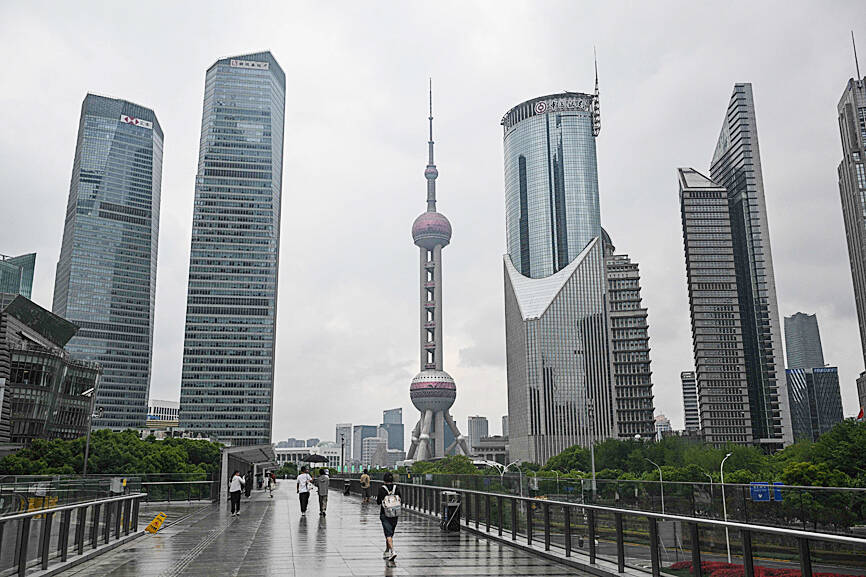Exposure to China among financial service companies in Taiwan fell 8.9 percent from a year earlier to NT$1.02 trillion (US$31.41 billion) at the end of last quarter amid concerns over a slowing Chinese economy and rising geopolitical risks, data compiled by the Financial Supervisory Commission (FSC) showed yesterday.
Their exposure was down NT$100.018 billion as Taiwanese banks cut their combined exposure — including lending, investments and interbank loans and deposits — to NT$936.161 billion, down NT$73.997 billion, or 7.33 percent, from a year earlier, commission data showed.
Local banks’ exposure to China reached the lowest level since the commission started tallying it in the third quarter of 2013.

Photo: AFP
Taiwanese banks in the second quarter scaled back lending to the Chinese market by a combined NT$77.259 billion from a year earlier and decreased investments by NT$7.659 billion over the same period, although interbank loans to Chinese counterparts rose by NT$10.922 billion, the FSC said.
Their exposure accounted for 20.3 percent of the sector’s net worth at the end of second quarter, sliding for a 24th straight quarter and also hitting the lowest level since the data became available, the data showed.
Taiwanese insurance companies’ investments in marketable securities in China fell 25.8 percent from a year earlier to NT$70.3 billion at the end of last quarter, accounting for only 0.21 percent of the sector’s total disposable funds, the commission said.
The investments in Chinese securities were all made by life insurers, while property and casualty insurers have held no securities in China since January last year, it said.
Taiwanese securities and futures brokerages, as well as securities investment trust and consulting firms, cut their combined exposure to China by 9.67 percent annually to NT$14.207 billion at the end of last quarter, accounting for a mere 1.88 percent of the sector’s net worth, it said.

Taiwan Semiconductor Manufacturing Co (TSMC, 台積電) last week recorded an increase in the number of shareholders to the highest in almost eight months, despite its share price falling 3.38 percent from the previous week, Taiwan Stock Exchange data released on Saturday showed. As of Friday, TSMC had 1.88 million shareholders, the most since the week of April 25 and an increase of 31,870 from the previous week, the data showed. The number of shareholders jumped despite a drop of NT$50 (US$1.59), or 3.38 percent, in TSMC’s share price from a week earlier to NT$1,430, as investors took profits from their earlier gains

In a high-security Shenzhen laboratory, Chinese scientists have built what Washington has spent years trying to prevent: a prototype of a machine capable of producing the cutting-edge semiconductor chips that power artificial intelligence (AI), smartphones and weapons central to Western military dominance, Reuters has learned. Completed early this year and undergoing testing, the prototype fills nearly an entire factory floor. It was built by a team of former engineers from Dutch semiconductor giant ASML who reverse-engineered the company’s extreme ultraviolet lithography (EUV) machines, according to two people with knowledge of the project. EUV machines sit at the heart of a technological Cold

Taiwan’s long-term economic competitiveness will hinge not only on national champions like Taiwan Semiconductor Manufacturing Co. (TSMC, 台積電) but also on the widespread adoption of artificial intelligence (AI) and other emerging technologies, a US-based scholar has said. At a lecture in Taipei on Tuesday, Jeffrey Ding, assistant professor of political science at the George Washington University and author of "Technology and the Rise of Great Powers," argued that historical experience shows that general-purpose technologies (GPTs) — such as electricity, computers and now AI — shape long-term economic advantages through their diffusion across the broader economy. "What really matters is not who pioneers

TAIWAN VALUE CHAIN: Foxtron is to fully own Luxgen following the transaction and it plans to launch a new electric model, the Foxtron Bria, in Taiwan next year Yulon Motor Co (裕隆汽車) yesterday said that its board of directors approved the disposal of its electric vehicle (EV) unit, Luxgen Motor Co (納智捷汽車), to Foxtron Vehicle Technologies Co (鴻華先進) for NT$787.6 million (US$24.98 million). Foxtron, a half-half joint venture between Yulon affiliate Hua-Chuang Automobile Information Technical Center Co (華創車電) and Hon Hai Precision Industry Co (鴻海精密), expects to wrap up the deal in the first quarter of next year. Foxtron would fully own Luxgen following the transaction, including five car distributing companies, outlets and all employees. The deal is subject to the approval of the Fair Trade Commission, Foxtron said. “Foxtron will be